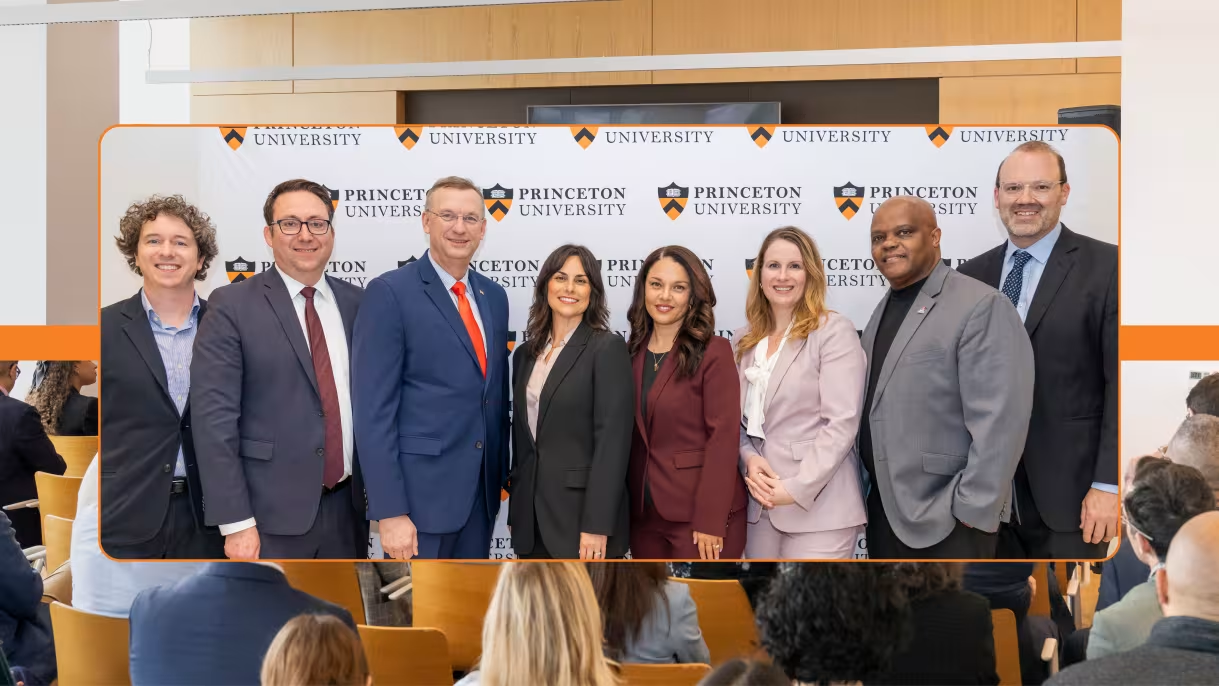

At Princeton SPIA DC Center, VA Secretary Collins Highlights Discussions on Bipartisan Criminal Justice Reform
Doug Collins, the U.S. Secretary of Veterans Affairs, paused and grew emotional as he recalled the hug he received from the first person released under the First Step Act, which he cosponsored in 2018 with U.S. Rep. Hakeem Jeffries, a New York Democrat, when he was a Republican member of Congress representing Georgia’s 9th District.
“We don’t vote on ideas but words on paper,” he said. “It doesn’t matter what I think this paper symbolizes, it matters what the words actually say. When words on paper became faces and hugs, we knew we did something.”
Collins was at the SPIA DC Center on April 3 – early in Second Chance Month – to discuss the future of criminal justice reform and public safety.

Despite the widening political divide in the United States, reform of the criminal justice system has garnered significant bipartisan support. The First Step Act, which authorized $375 million for new programs to support formerly incarcerated people, prohibited the use of solitary confinement on juveniles, retroactively applied the reduction in sentencing disparities between crack and powder cocaine, and more, passed by overwhelming margins – 87 to 12 in the Senate and 358 to 36 in the House. President Trump subsequently signed the bill into law.
At the SPIA in DC event, titled “Second Chances Under a Second Trump Administration,” Collins, a former church pastor, grounded his support of criminal justice reform in his faith.
“I truly believe there’s inherent value and inherent worth in everyone, so how can I truly look askance at someone who’s made, in my perspective, in God’s image?” he told moderator Udi Ofer, the John L. Weinberg/Goldman Sachs and Co. Visiting Professor and Lecturer of Public and International Affairs. “We’re not throwaway people. Everyone needs a second chance.”
Asked to make the case for the kind of bipartisanship that led to the passage of the First Step Act, Collins said, “I think the case is, Do you want to see improvement? It’s simple.”
According to Collins, much of the real work of bipartisanship often happens away from legislative sessions and television cameras. That quiet collaboration is no less effective than the more visible conversations lawmakers and policymakers have in the public eye.
“Finding issues and finding people to talk to, and some of those conversations could come in a coffee shop where nobody sees you, but they’re finding ways to make a difference,” he said. “It’s the only way we can really make change. It’s the only way we can make a difference.”
Collins noted the relevance of criminal justice reform to his new role as head of the Department of Veterans Affairs. Vets, for whom homelessness, death by suicide, mental health troubles, and incarceration are significant issues, bring a unique perspective to the issue, he said, because of the often difficult transitions they have to make when they leave the military and return to civilian life.
“We train our men and women to go to war and fight. We train them to kill,” Collins said. “This is not a glamorous profession. That is another thing to take home back home. On the streets, they’re not trained to fight and kill each other.
“Are we really wanting to help veterans and help the folks who went to war for us? Are we actually giving them a treatment and a way out? It says a lot about us as a culture if we don’t.”
Collins believes that Trump will remain open to criminal justice reform in his second term, though he added that Congress will need to work better together – as he and Jeffries did – to advance legislation for the president’s consideration. Again he cited his religious convictions as a basis for reaching across the aisle.
“My faith called me to talk to people who are not like me, who may not think like me, act like me, or talk like me,” he said. “It’s not my job to change you. It’s my job to live a life you may want to emulate. It’s the same thing with bipartisanship. Are you willing to let yourself be secure in who you are to accept that someone else may have the right answer, too? If you do that, we may have a chance.”
Following Collins’s remarks, Ofer led a panel discussion with leaders from four organizations advocating for criminal justice reform: Heather Rice-Minus, the president and chief executive officer of Prison Fellowship; Hillary Blout, the founder and executive director of For the People; Ronald Simpson-Bey, executive vice president of strategic partnerships at JustLeadershipUSA; and Ana Zamora, the chief executive officer of The Just Trust.
“The biggest misconception is that the right and the left don’t agree on the need for criminal justice reform,” Zamora said. “The broad center of this country, which is quite big, all really agree on the basic concepts we fight for every day. The idea that the funnel into incarceration should get narrower, that those who do need to be incarcerated have an experience that is fundamentally different, that people can choose a new path, that the funnel out of prison should be expanded. The vast majority of the middle agree on those concepts. Criminal justice reform is the stuff in the middle. That’s where the magic happens.”
Importantly, Zamora added, criminal justice reformers must be candid that crime and violence harm people, and that one of government’s primary responsibility is to protect the citizenry from them.
“This movement has lost credibility if we cannot acknowledge that crime is unacceptable,” she said.
The Washington, DC event marked the latest effort by Princeton SPIA to spotlight bipartisan, evidence-based approaches to criminal justice reform. Last fall, 14 organizations from across the political spectrum gathered on Princeton’s campus to develop a set of shared principles on criminal justice policymaking. In December, students from the Princeton Policy Advocacy Clinic released a report assessing the potential impact of the EQUAL Act — a bipartisan bill that would eliminate sentencing disparities between crack and powder cocaine.

